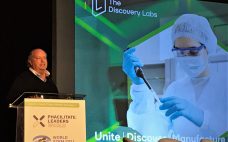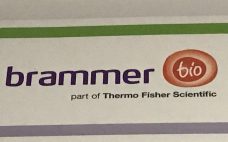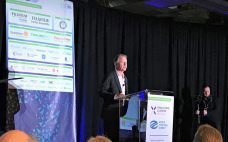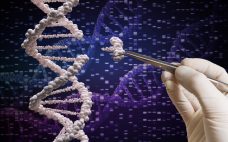The newly formed Center for Breakthrough Medicines is building what it claims to be the world‚Äôs largest third-party cell and gene production facility at an ex-GSK site in Pennsylvania. For the production of cell and gene therapies, size matters, according to Brian O‚ÄôNeill, founder of the Discovery Labs. He announced this week at the Phacilitate Conference in Miami, Florida that a 680,000 square-foot facility at a site in King of Prussia, Pennsylvania ‚Äď a former GSK R&D campus sold to…

Therapeutic Class
Thermo Fisher envisions 25% annual growth for gene therapy biz and no slowdown
Thermo Fisher claims to be the ‚Äúleading outsource provider of viral vector manufacturing,‚ÄĚ nine months after entering the space through the acquisition of Brammer. In March 2019, Thermo Fisher expanded its presence in the CDMO space by announcing plans to buy viral vector manufacturer Brammer Bio. Weeks later, the $1.7 billion deal closed, propelling Thermo Fisher into the gene therapy manufacturing space. Nine months on and Thermo Fisher CEO Marc Casper said the business has ‚Äúgot off to a good…
Phacilitate 2020: FDA commercial cell and gene therapy forecast ‚Äėunlikely‚Äô
Manufacturing issues and a scarcity of new commercial products leave predictions that 10-20 cell and gene therapy approvals each year by 2025 somewhat fanciful, says Dark Horse Consulting. In his plenary address at the Phacilitate conference yesterday, Anthony Davies, founder of cell and gene therapy specialist firm Dark Horse Consulting, reflected on the difficulties the sector has faced since the high of 2017 when three products achieved US Food and Drug Administration (FDA) approval: Kymriah (tisagenlecleucel) and Yescarta (axicabtagene ciloleucel),…
Humira taking 45% hit internationally but US could fare better, Abbvie
The impact of competition in Europe on its bestseller Humira (adalimumab) has allowed AbbVie to set expectations for when biosimilars enter the US market in 2023. Monoclonal antibody Humira is the top selling drug in the world, pulling in $19.9 billion (‚ā¨17.9 billion) in sales for AbbVie in 2018. But biosimilar competition has begun making inroads into sales ‚Äď outside of the US at least. Biogen and Samsung Bioepis, for example, reported last August that its adalimumab product Imraldi exceeded…
Regeneron lays down the bispecifics at JP Morgan
Regeneron says it can now roll out a lot more bispecific antibody-based therapies including a new class of costimulatory bispecifics. Regeneron just rejigged its Praluent and Kevzara¬†co-marketing deal with Sanofi. The ‚Äúsimplified‚ÄĚ accord was covered at the JP Morgan healthcare conference last week. However, Regeneron devoted much more of its presentation to bispecific antibodies. CEO Len Schleifer told delegates progress made by two bispecific drug candidates – REGN1979 and REGN5458 ‚Äď were indicative of the utility of its VelocImmune and…
Sarepta plans gene editing center; files DMD therapy for review
Genetic disease-focused firms need infrastructure says Sarepta, which shared plans for a gene editing center of excellence at the JP Morgan healthcare conference. The gene editing center will be in Durham, North Carolina according to CEO Douglas Ingram, who said investing in capacity and knowhow is key to Sarepta‚Äôs longevity. ‚ÄúIf one is going to be an enduring genetic medicine company, we are going to need infrastructure,‚ÄĚ he said, citing partnerships as an important part of the expansion. ‚ÄúWe’re deepening…
Horizon says base editing tech could make cell therapies safer
Horizon Discovery Group says a new DNA editing tech could move multi-gene knockout cell therapies through trials with improved safety profiles. The technology in question ‚Äď called the Pin Point system ‚Äď is an editing platform that allows developers to precisely modify DNA at the base-level. The approach differs from CRISPR/Cas9 and other conventional editing techniques that create cuts in genes, which could result in unintended changes and lead to deleterious effects in patients Horizon says. The firm will offer…
Tessa and CellVec both set up Singapore plants to support cell & gene therapies
Tessa Therapeutics will open a plant in Singapore for its CAR-T programs, while CellVec has opened a viral vector facility on the island state to support customers‚Äô gene therapy projects. Singapore-based biotech Tessa is developing its own autologous cellular therapies and has told us it plans to open a 90,000 square-foot plant to support clinical and commercial efforts. ‚ÄúTessa will use the new facility for the clinical and future commercial manufacturing of our late-stage clinical programs,‚ÄĚ the firm said, adding…
Novartis inks 5 years vector supply extension with Oxford Biomedica
Oxford Biomedica will keep supplying Novartis with the vectors needed to make Kymriah and other CAR-T products under a five-year deal extension. The new agreement will see Oxford Biomedica receive $75 million for manufacturing, undisclosed process development payments, a facility reservation fee as well as previously agreed royalties on chimeric antigen receptor (CAR-T) product sales. The extension deal also requires the firm ensure at least two manufacturing facilities are capable of commercial supply. Oxford Biomedica will make the vectors at…
Back to school: GE and UMass partner on academic viral vector plant
GE Healthcare has partnered with UMass to establish a viral vector manufacturing facility ‚Äď its latest tie-in with academia in the cell and gene therapy space. The planned facility at the University of Massachusetts (UMass) Medical School‚Äôs Worcester campus will provide recombinant adeno-associated virus (AAV) vectors for preclinical research. High demand and a shortage of capabilities for viral vectors means the 3,220 square-foot facility, decked out with GE Healthcare‚Äôs viral vector FlexFactory platform, will help alleviate the current wait researchers…










